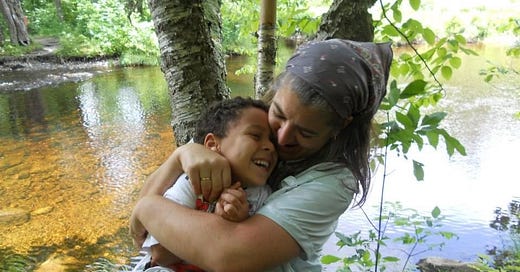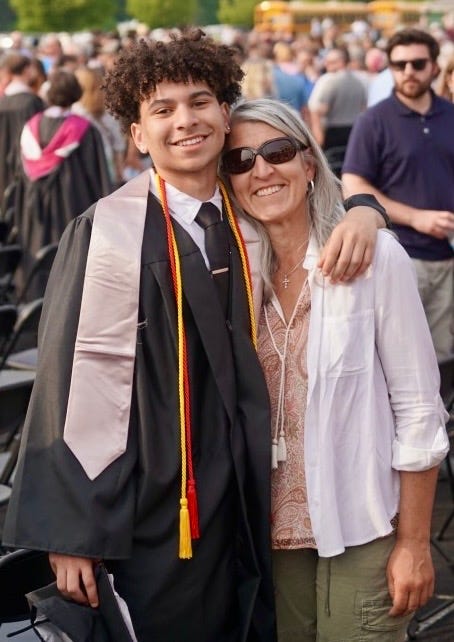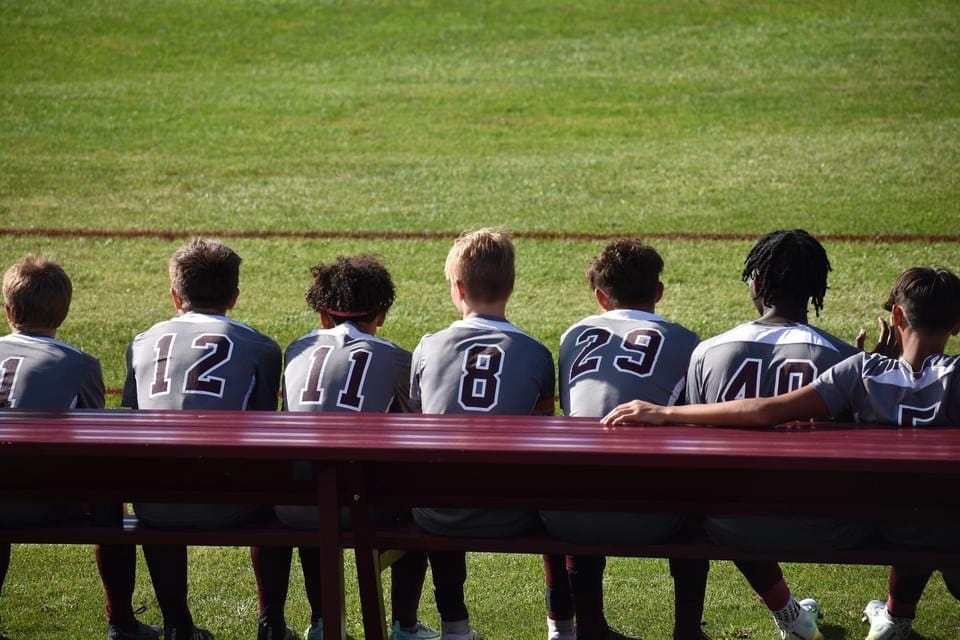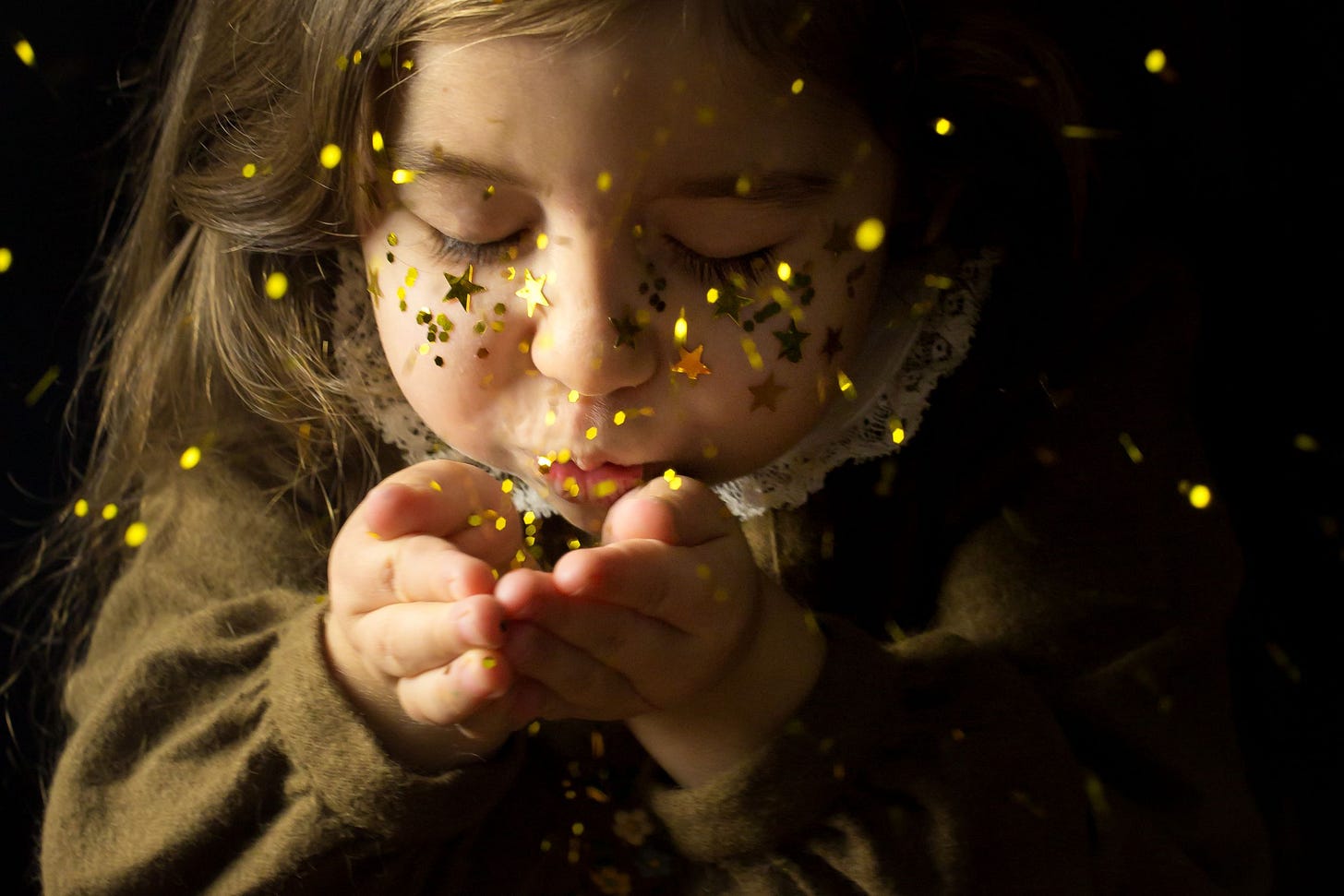If you read last week’s post (catch up on previous chapters here), you know I’ve been focused on building soil as my therapy—the slow, sacred work of decomposition, my life transition, and the renewal starting in the world right now.
Well, a whole different rebirth is happening to me this week—my only child turned 18 a few weeks ago and just graduated from high school Sunday. My little boy is becoming a man and it’s finally hitting me.
I spent hours processing this emotional overload with my hands in the soil, gardening, and landscaping until either my tools or arms gave out. The more I tilled and pondered my motherhood, the more I saw how deeply my passion to empower young women of faith has grown out of my love for my son.
So, this chapter of The Lydia Effect is rooted in that processing and how my motherhood is the foundation of my calling. This one was hard to write, so I would love to hear your thoughts in the comments below, or send me a text or DM. Let’s dig in.
Surprised by Motherhood
My son Danilo is a miracle baby. Despite years of prayers and high-tech infertility treatments, I couldn’t get pregnant. As a scientist and a bit of a control freak, this was devastating. It broke me, which also broke my marriage. I moved far away and spiraled into workaholism and achievement for years to outrun the grief. That season of my life ground to a halt at 36 years old when I stared down in shock at a positive pregnancy test.
I reveled in my pregnancy and endured a difficult birth, but things soon fell apart with Danilo’s father, too. I became a single mom, moving home to Maine in time for Danilo to start kindergarten. I raised him with the help of my own mom—another strong woman whose faith and prayers guided us daily.
It was another tough season of my life. I worked full-time and battled constant burnout and PTSD, but I did my best to build a life for my son while still recovering. My years of infertility helped me to see this struggle as a blessing, and I took comfort knowing we were home. And as he grew, so did I.
Our Bunker in the Chaos
During the pandemic Danilo and I isolated at our house on the edge of the woods, just the two of us tucked away. He did his middle-school assignments and played video games online with his friends while I worked at home and overdosed on DIY projects and podcasts dissecting our cultural moment. (This is also the time when God found me wandering—more on this journey in future posts). The polarization deepened, with political issues becoming almost religious in their fervor. But I am staunchly non-political after leaving political science for soil science, so I kept looking for another way to help.
As the #MeToo movement emerged, I stayed out of it. Don’t get me wrong—I have plenty of my own #MeToo stories etched into my story, so I understand the fury. But the swing of the pendulum felt destructive. I was already concerned about Danilo as a young black man, and this anti-boy undercurrent was a new threat. He and I talked about gender and how to protect and treat girls, the confusion boys feel, the rise of BLM, and everything else that blared at us from screens. I studied and prayed. And as life began to open back up, I did my best to listen and adapt, staying anchored in my faith below the cultural battles.
Soccer Mom Taxi
Once the pandemic had passed and we started back into soccer travel league, I became a lucky taxi driver shuttling boys to the games. I loved it. I got them snacks, let them play their music, and listened. If you are a parent that drives kids around, you probably noticed: they forget you are there and just keep chatting.
I learned a lot about teen boys’ emotional lives during these precious drives. I felt like an anthropologist behind the bushes as I listened to how cultural messages and gender issues affected them. I soaked up everything I could, treasuring these moments in my heart.
And I loved these boys—they were Danilo’s tribe, and I knew they were a unit so they formed an extended part of my own motherhood.
Boys and Girl Power
As I drove this car full of growing boys and listened to their banter about girls and crushes, what I heard clearly was this: they craved the attention and approval of girls. And more than I had realized, the girls were the ones defining the terms of engagement. They held the power.
On some level, as a scientist, I probably already knew this—maybe from biology class or a wildlife ecology lecture about how female mammals choose their mates. But the culture I grew up in and my own #MeToo experiences had blinded me. As I listened to the hearts of these boys, I got curious about my misperceptions.
The girl they liked motivated their behavior—that is power. Their rowdy humor and bravado were a smokescreen for deep vulnerability and their desire to be seen and chosen. Sure, they gave each other bad advice about girls instead of talking to them. Once I blew my cover by saying “Why don’t you just ask her?!” from the front seat. But to be fair, the girls intimidated them.
Girls hold real power. And often, they act in ways that seem mysterious or confusing to these boys. They’re maturing faster but they’re also under intense pressure. Be strong, but not too strong. Be pretty, but not too available. Be smart but not intimidating. These struggles I understood all too well, but it was even worse than when I was a teen.
The teenage girl mental health crisis reflects today’s pressure cooker with a recipe of social media, identity issues, and impossible expectations. The Center for Disease Control statistics for depression, anxiety, and suicidal ideation are heartbreaking, with nearly 3 in 5 teen girls reporting persistent sadness and 1 in 3 seriously considering suicide. The article linked above from 2023 still haunts me with this plea in the last line: “I want adults to believe young girls.” Yeah, I get that—my throat sometimes aches from things I said that weren’t heard or unsaid things after I gave up trying.

Boys are struggling, too. We’ve made strides helping girls in schools, but boys are also falling behind at academic performance and feeling valued, too. Our culture is failing boys and girls in different ways. Something is clearly missing in our equation of equality and progress, especially with our current struggles for meaning and the spiritual identity crisis.
Who is Leading Who?
I had it wrong, too. For years, in my healing work, I saw myself mostly through the pain of what had been done to me. Yes, I have been traumatized and silenced by men, just like so many women have. But when I felt the world leaning anti-boy, that became a threat to my son and my mother instinct kicked in. I saw how boys and girls are both hurting from our broken systems. My heart opened to hear the hearts of his boy tribe. They’ll probably never know it, but they helped me see what I had forgotten: girls and women have raw power. And no, no, no a thousand times no — not just about sex.
Girls have emotional, social, relational power that can change community dynamics and define relationships. And if no one helps them root that authority in truth and faith, that power can become warped. Unmoored, it slips back into what we want to grow beyond—old patterns of control through beauty and sex, performance, and manipulation—or stuck in the background waiting for permission.
I am not talking about girls being dangerous because they evoke attraction. I am not promoting fear-based oppression like controlling their bodies, telling them what to wear, or silencing them into submission. I am also not focusing on positional authority, titles, or pronouns, which can become distractions to leadership through action. I am talking about helping girls claim and wield their real God-given power with ferocity: their spiritual authority in their identity in the image of God.
Girl power is an untapped wellspring of spiritual leadership. Imagine what the future could hold if we helped girls root that power in the sacred. Imagine if we helped the seed of their calling blossom into a beautiful garden with faith, mentoring, and bold examples.
I know this is a tricky statement. Women and girls are still silenced and, in some cases, abused. The cultural narrative tells us that girls are victims, and many are. I’ve been one myself more than once. Trauma is real, and so is injustice. But I know that power and pain can coexist in one girl. I am that girl. But my scars don’t strip me of my authority. They deepen it.
If we only talk about victimization, institutional debates, and identity politics, we have stopped short of telling girls and young women the truth: that they carry the spiritual authority to lead with grace and courage—no matter what traumas they suffered or glass ceilings they may never break through. And while boys slowly mature, girls can root themselves in their faith and learn to stand their ground. That helps everyone.
Back to Lydia
What I also heard in the boyish chatter was another need: girls who are clear on who they are and what they are worth. They need girls with the strength to stand up for what’s right, offering emotional leadership and the kind of social glue our world is starving for. They need a girl who neither manipulates nor feeds immature egos but stands alongside them in clarity, courage, and mutual respect. This is the kind of woman I saw in Lydia when I first read her story.
Lydia was an immigrant to a Roman colony and yet she still wielded power. She prayed, paid attention, and spoke up boldly. She didn’t ask permission but acted immediately to open her home and form a church— a sacred space and gathering place for encouragement in difficult times.
A Mother’s Prayer
This is the kind of woman I pray Danilo finds for a wife. I don’t pray for a nice submissive girl—that’s not what an intelligent young man with strong faith like his really needs. I pray he finds a fierce and kind, deeply-rooted woman—one who knows who she is and can stand beside him in purpose and courage. And, yes a woman who he will follow when she reminds him to get on his knees beside her in prayer with her when times get tough. And they will.
So yes, my prayer for my son and his future relationship fuels my passion for writing about Lydia. But it’s bigger than just one mom and one son. It’s bigger than just me processing my own pain. Lydia’s story shows us what happens when a woman of faith is courageous and takes action, and when she builds a church that becomes a key part of a movement. That’s the kind of Spirit-led leadership the world needs now.
In the next chapter, we’ll go deeper into this: the power of young women’s leadership and what we might see if we embrace and empower women and girls like Lydia.
This was a tough chapter to write and dug up a lot of emotions. Maybe it does for you, too.
Reflection Prompts:
What does “girl power” mean to you?
How is our culture supporting or undermining you or young women you know in their faith, self-worth, and identity?
When you think about the boys and men in your life, what are they struggling with and how might our culture help them?
When you are listening to teens talk about their issues, what do you hear? Do you talk with other parents or adults about it?
Is there someone that would benefit from this post and a conversation? If so, please share.












I feel like we could have a book club on just this chapter. There is SO much packed into this piece that I want to unpack with other parents and people of faith who care about younger people. It brings up so much of my own desire and fears for my own teenage son (I am also a soccer mom driving the boys around) and my daughter.
I love the way you process!!!